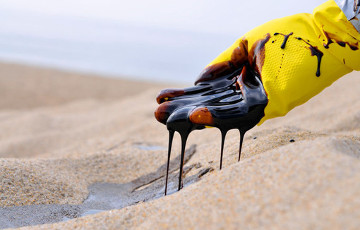When Russia Runs Out Of Oil?
5- Mikhail Krutikhin
- 28.11.2023, 12:49
- 10,302

Moscow has sharply reduced its maritime exports of oil and oil products.
In the week from 12 to 19 November they fell by 580,000 barrels per day, or almost 20% compared with the average for the month. It was expected that more oil cargoes would go abroad as the government had just lifted a temporary ban on petrol exports.
Analysts were quick to explain the drop as a deliberate move by the Russian authorities to demonstrate to their OPEC+ partners their commitment to cutting production in order to stabilise the market. This appears to be happening on the eve of the OPEC+ meeting, which - after several interruptions - is now scheduled for 30 November.
In fact, Russian oil producers are now producing less than the quota agreed by OPEC+. Our country's quota is 9.949 million barrels per day, and production in October was recorded at 9.407 million. (Here we have to rely on OPEC data, as information on oil production in Russia since this spring is considered almost a state secret and is not published).
However, the intentionality of this restraint and the reason for the sudden failure of exports raise doubts.
First, the government's administrative regulation of production and exports should not be exaggerated. It has never been able to influence the management of oil companies in a timely manner, within a few weeks.
The response of the oil companies to pressure from the authorities is not immediate, but takes five or six months.
Secondly, there are other, much more realistic reasons for the decline in exports. The initiators of the sanctions, irritated by the fact that Russia had learnt to circumvent them with the help of pliable tanker companies and not too respectable insurance companies, started to hunt for "shadow" tankers and threatened to tighten control over the quality of insurance. Smuggling fell sharply, and the price of Russian oil began to fall, returning to the sanctioned "ceiling" of $60 per barrel of Urals blend. There are even indications that Russian tankers in the Danish Straits are being checked for the presence of normal insurance and for compliance of the cargo price in the documents with the allowed norms. The number of tankers whose owners are willing to take risks has diminished - and this can only have an impact on Russian maritime exports.
Thirdly, industry observers are suspicious of any decline in oil production in the country: is it not the same decline in production that both oil companies and government agencies have been warning about for a long time?
I remember that in 2016 Rosnedra (Federal Agency for Subsoil Use) concluded that "the production security with proven reserves of fields under development is 35-36 years" and added that if the so-called hard-to-recover reserves (HTRR) are not developed, it will be possible to ensure production for no more than 20 years. According to this forecast, Russia's conventional, non-hard-to-recover oil reserves will be exhausted by around 2036, and oil companies will have to focus exclusively on TRIZ - and their production costs will be so high that the industry will no longer be profitable.
The depletion of commercially viable reserves is accelerating. In Western Siberia, where more than 40% of Russia's oil is produced, production this year will be around 215 million tonnes, down from 242 million tonnes in 2015. Experts gathered at the Yugra economic forum in Khanty-Mansiysk this week complained that no new fields have been discovered in a year, and only two small previously discovered fields have been brought into production.
Oil companies are trying not only to maintain the current level of production from existing fields, but also to postpone the moment when the exploitation of old deposits will no longer make economic sense. Not only 'secondary' methods of stimulating oil production, such as primitive borehole fluid, but also 'tertiary' and even 'quaternary' methods are being used, but production is still falling. According to field workers, the wells are no longer producing oil, but "well fluid" with a water content of more than 92%.
According to the calculations of Alexander Sokolov, director of geological exploration at Petrogeko, and his colleagues, in some regions of Western Siberia the reserves for profitable production do not exceed nine years, but there are also areas with "a life expectancy" of 18 years.
When talking about Russia's deliberate decisions, allegedly able to manipulate oil production in coordination with other OPEC+ members, one should not forget the completely objective processes taking place in the industry. The deterioration of oil reserves is beginning to play an increasingly important role in the fate of Russia's main economic sector.
Mikhail Krutikhin, The Moscow Times











